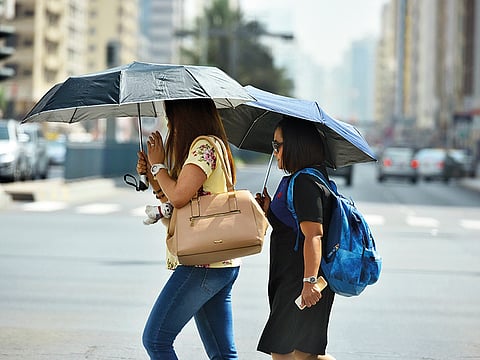Protect yourself from the dangers of the sun
Despite awareness, people are often negligent about sun protection, doctors say

Abu Dhabi: The summer holidays have begun in the UAE and doctors are urging residents to ensure that they and their children are properly protected from the sun as they engage in outdoor activities.
Unfortunately, it is children who suffer from sunburn more often than adults, simply because of insufficient awareness about how to protect themselves, they added.
“Even among people who are aware of the need to use sunscreen, very few use enough of the product to ensure they are safe from the sun’s harmful radiation. But such protection is necessary, especially for those who have fairer skin and in order to minimise the risk of developing skin cancers,” added Dr Ikramullah Al Nasir, dermatologist and medical director at Dermacare Skin Centre.
Doctors recommended that residents must apply sunscreen, with a sun protection factor or SPF of at least 30, at least half an hour before heading outdoors. Applying the product moments before going out doesn’t allow it to protect the skin, they cautioned.
Dr Al Nasir said one must apply two milligrams of sunscreen per square centimetre of skin.
“With the advent of summer, there is at least a 10 per cent increase in the number of reported cases of sunburn. Skin conditions are never pleasant, and this is why parents should take special care to ensure that children are well protected as they take to the pools or sign up for water sports,” urged Dr Noushin Abdu, specialist dermatologist and cosmetologist at Universal Hospital.
These measures include the regular application and reapplication of sunscreen, the limiting of direct exposure under the sun, and adequate hydration.
“There are a range of different kinds of sunscreens available now, so everyone should be able to find something to suit their needs. For example, if you have acne-prone skin, you can opt for sunscreen with lower SPF, or look for a spray-on or gel-based sunscreen that clogs the pores less. Whatever the case may be, applying sunscreen is essential protection, even on a cloudy day,” Dr Abdu said.
Otherwise, the risk of suffering from a painful sunburn is very high, and this can cause painful peeling of the skin, itchiness and even swelling of the affected areas. In severe cases, people can also experience hyperpigmentation.
Sunscreen is just as essential when people undertake watersports or go for a swim, but a waterproof variety must be used.
is when the sun is at its peak, so it is best to stay indoors
For those who wish to develop a healthy tan, it is also recommended to limit sun exposure to an hour at a time, Dr Abdu said.
“People with fair skin and light hair have less melanin in their skin, which affords them less protection from radiation. So it is important to limit sun exposure, especially as sunburn cannot be immediately felt when it occurs,” she explained. It is also important to apply a sunscreen with SPF 30 even when tanning, and this amount of sun protection will still allow for a tan under the UAE sun.
Limiting sun exposure is also important because much harmful ultraviolet radiation is reflected from beach sand and stony surfaces, so umbrellas only block some of the radiation, Dr Al Nasir added.
Residents must also stay hydrated in order to prevent premature ageing of the skin.
“The skin can appear dull and you would develop fine lines if you do not drink enough water in the summer heat,” Dr Abdu said.
Staying safe under the sun
■ Use a sunscreen with sun protection factor of at least 30.
■ Make sure to apply the sunscreen at least half an hour before heading out.
■ Ensure that sunscreen is reapplied every two to four hours when staying outdoors, and remind children to do the same.
■ Use waterproof sunscreen when swimming or engaging in water sports.
■ If you have fair skin and light-coloured hair, try to limit sun exposure to an hour at a time to prevent sunburn.
■ Look out for signs of heatstroke when staying outdoors, including increased body temperature, agitation and confusion, nausea, headache and rapid heart rate.
■ Hydrate regularly, and increase your water intake from 8 to at least 12 glasses a day when you spend time outdoors.
■ Try to stay indoors between 11am and 1pm, when the sun is at its strongest.
■ Wear loose-fitting, light clothing and wide-brimmed hats for a day out.
Sign up for the Daily Briefing
Get the latest news and updates straight to your inbox



